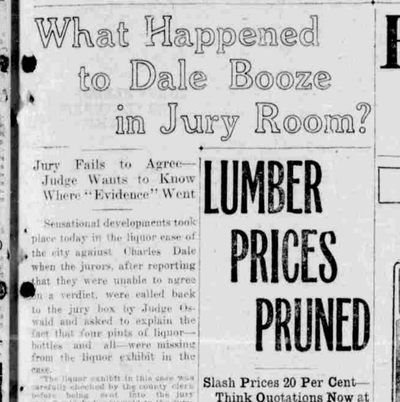100 years ago in Spokane: Jurors in bootlegging trial admit to imbibing themselves

The judge was hopping mad in the Charles Dale bootlegging trial, but not at the defendant.
He was furious with the jury when he discovered that some of the evidence – four bottles of liquor – had gone missing from the jury room.
“When the liquor was returned to the court room after your deliberation, we find that there is a shortage of four bottles, only 32 being returned,” Judge Oswald said. “How can you ladies and gentlemen explain this to me?”
Several of the men on the jury stood up and admitted that they had “sampled the evidence.” They justified this on the grounds that they had to make sure it was really liquor before passing judgment.
The judge conceded that perhaps they had a point, but that didn’t explain why entire bottles were missing.
“They are a part of the evidence in the case,” he reminded them. “Missing exhibits in liquor cases tend to lower the dignity of the court and make justice a travesty.”
This all took place after the jury had reported that they were unable to reach a verdict in the case. The judge, after lecturing them, dismissed the jury.
From the streetcar beat: A group called the Municipal Ownership League filed a petition begging the city to acquire Spokane’s two beleaguered streetcar lines.
This was prompted by the recent news that both lines were planning to raise their fares to 8 cents. The petition branded the 8-cent fare as “another attempt to commit suicide.”
Instead of improving the financial health of the streetcar systems, the fare increase would simply decrease ridership, contribute to more autos on the streets, and “bust the streetcar lines.”